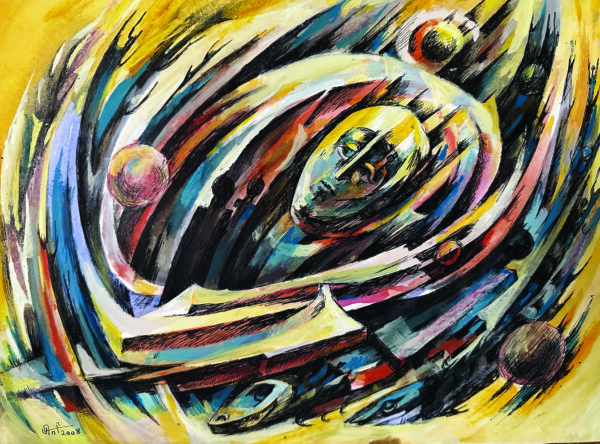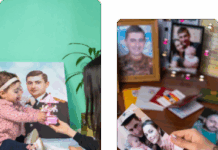YEREVAN — This fall, the Tekeyan Cultural Center in Yerevan hosted an exhibition of works by award-winning and decorated Karabakh (Artsakh) sculptor and painter Robert Askaryan: He agreed to sit for an interview.
Marut Vanyan: Recently Azerbaijani President Ilham Aliyev was in Stepanakert with his son. They were standing right in the area where you carved khachkars, in front of your studio. I remember, during the blockade, when there were no cars in the city due to lack of fuel, the sound of your hammer echoed in that void. Now Aliyev is standing in that same place. What is the place in general for you?


Robert Askaryan: You know, my father’s house was there. Let me start a little further back. Earlier, there was a market and a school there, and next to them was my grandfather Arshak’s house. As a child, I remember there was also a fabric shop there. I liked the smell of the fabrics, and the owner was a kindly small woman. During the Soviet years, the school and market were destroyed and a park was built named after Azizbekov, who was one of the 26 Baku Commissars. Thus, over the years, that area has changed a lot, but the old picture was always in my mind. Right where you say Ilham Aliyev is standing now, I created several sculptures, khachkars, but I know that my khachkars no longer exist. I checked via Google Earth, my sculptures are no longer in their place. If a person creates somewhere, that place becomes familiar to him. I finished carving the last khachkar on September 2. Soon it will be exactly one year since we left Artsakh. When I came to Yerevan, one of my friends gave me the keys to his studio, and another friend gave him the keys and went to the United States. That’s how artists should be. If one has two brushes, the other you should give to another artist.

Marut Vanyan: I also follow what is happening in Stepanakert. I see how people’s belongings are thrown out of the windows by Azerbaijanis. I asked my sister if she saw that Azerbaijanis converted their house into student dormitories. She said yes, with my Stepanakert neighbor we were watching it. We were crying and laughing at the same time, she said. I know that you had two sculptures in Renaissance Square, a pomegranate tree and a khachkar in memory of the 2020 fallen soldiers m. They are gone now. What are you doing, crying or laughing?

Robert Askaryan: My response on that is to create more art to open new exhibitions. It’s really hard, but that’s how I deal with the pain. I realize and understand that, I did not expect anything else, but it is a sign of their weakness, not strength. Usually, the winning side is generous and tolerant, but destroying silent monuments, khachkars, it only proves their weakness. A strong man does not do such a thing. That’s just ridiculous, Aliyev’s goal is to erase the Armenian heritage in Artsakh, but there is so much Armenian heritage there that it simply cannot be erased. We have lived on that land for centuries, there are several layers of culture on that land, what can Aliyev do, could he dig whole Artsakh like a garden? I remember my mother’s admonition: she said never lie, that when a person lies, he is lying to himself first of all. I didn’t understand it then, but she said I will get it when I grew up. It’s the same in art, you can’t lie. If someone is lying, the other person may not know it, but you know inside that you are lying, so you are hurting yourself not others. Didn’t Picasso also said that? I always leave the punishment to God. Lying is a habit, just as telling the truth. It’s a choice.

Marut Vanyan: In my archives, I found a video which I took during the Artsakh blockade, where you say that this is a slap on the face, and that we should take away lessons. Have we taken away any lessons?










